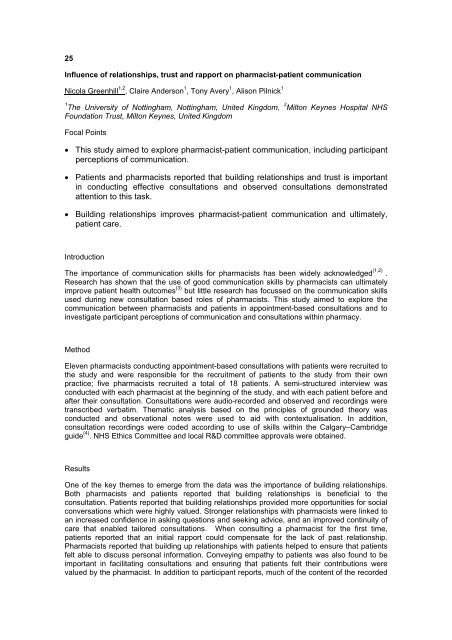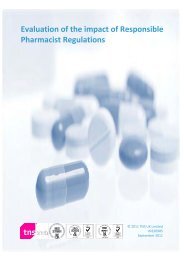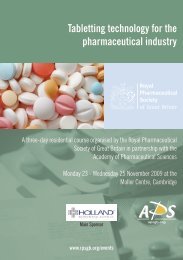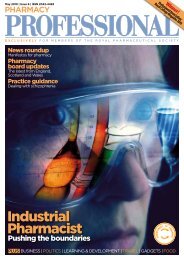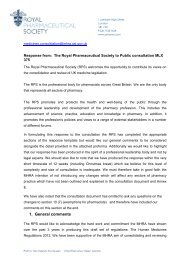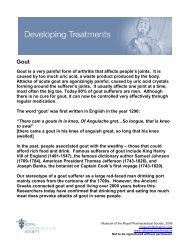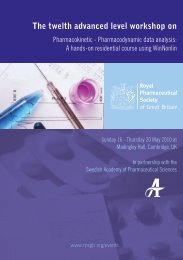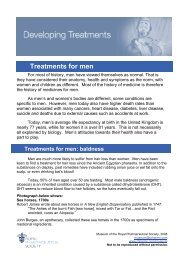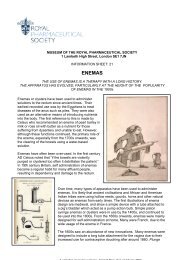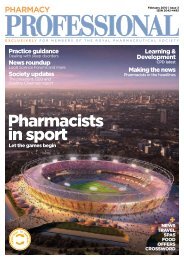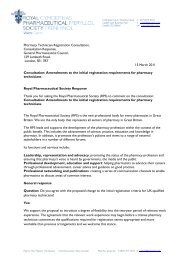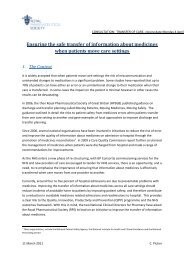RPS Conference 2010, Abstracts 2010 - Royal Pharmaceutical Society
RPS Conference 2010, Abstracts 2010 - Royal Pharmaceutical Society
RPS Conference 2010, Abstracts 2010 - Royal Pharmaceutical Society
Create successful ePaper yourself
Turn your PDF publications into a flip-book with our unique Google optimized e-Paper software.
25<br />
Influence of relationships, trust and rapport on pharmacist-patient communication<br />
Nicola Greenhill 1,2 , Claire Anderson 1 , Tony Avery 1 , Alison Pilnick 1<br />
1 The University of Nottingham, Nottingham, United Kingdom, 2 Milton Keynes Hospital NHS<br />
Foundation Trust, Milton Keynes, United Kingdom<br />
Focal Points<br />
• This study aimed to explore pharmacist-patient communication, including participant<br />
perceptions of communication.<br />
• Patients and pharmacists reported that building relationships and trust is important<br />
in conducting effective consultations and observed consultations demonstrated<br />
attention to this task.<br />
• Building relationships improves pharmacist-patient communication and ultimately,<br />
patient care.<br />
Introduction<br />
The importance of communication skills for pharmacists has been widely acknowledged (1,2) .<br />
Research has shown that the use of good communication skills by pharmacists can ultimately<br />
improve patient health outcomes (3) but little research has focussed on the communication skills<br />
used during new consultation based roles of pharmacists. This study aimed to explore the<br />
communication between pharmacists and patients in appointment-based consultations and to<br />
investigate participant perceptions of communication and consultations within pharmacy.<br />
Method<br />
Eleven pharmacists conducting appointment-based consultations with patients were recruited to<br />
the study and were responsible for the recruitment of patients to the study from their own<br />
practice; five pharmacists recruited a total of 18 patients. A semi-structured interview was<br />
conducted with each pharmacist at the beginning of the study, and with each patient before and<br />
after their consultation. Consultations were audio-recorded and observed and recordings were<br />
transcribed verbatim. Thematic analysis based on the principles of grounded theory was<br />
conducted and observational notes were used to aid with contextualisation. In addition,<br />
consultation recordings were coded according to use of skills within the Calgary–Cambridge<br />
guide (4) . NHS Ethics Committee and local R&D committee approvals were obtained.<br />
Results<br />
One of the key themes to emerge from the data was the importance of building relationships.<br />
Both pharmacists and patients reported that building relationships is beneficial to the<br />
consultation. Patients reported that building relationships provided more opportunities for social<br />
conversations which were highly valued. Stronger relationships with pharmacists were linked to<br />
an increased confidence in asking questions and seeking advice, and an improved continuity of<br />
care that enabled tailored consultations. When consulting a pharmacist for the first time,<br />
patients reported that an initial rapport could compensate for the lack of past relationship.<br />
Pharmacists reported that building up relationships with patients helped to ensure that patients<br />
felt able to discuss personal information. Conveying empathy to patients was also found to be<br />
important in facilitating consultations and ensuring that patients felt their contributions were<br />
valued by the pharmacist. In addition to participant reports, much of the content of the recorded


